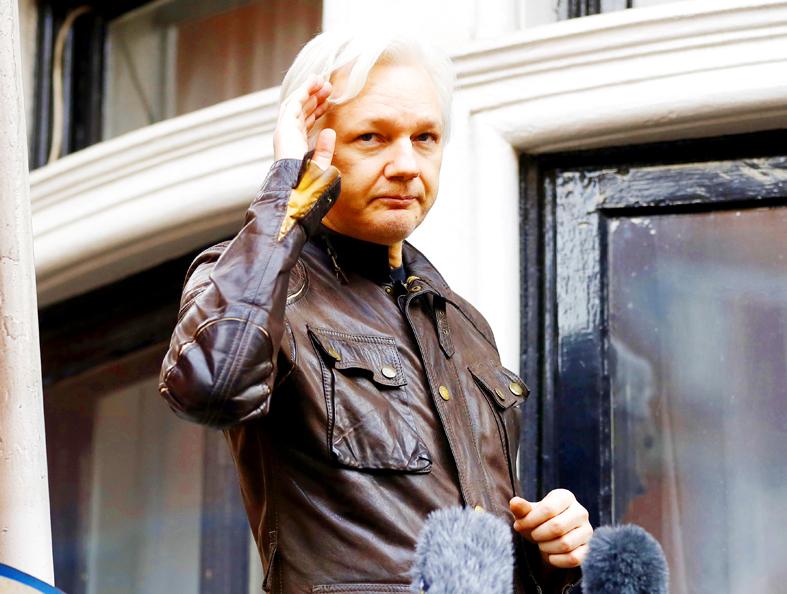Julian Assange on Monday was denied permission to appeal to the UK Supreme Court against moves to extradite him to the US, where he could face a lifetime in prison.
Washington wants to put the WikiLeaks frontman on trial in connection with the publication of 500,000 secret military files relating to the US-led wars in Iraq and Afghanistan.
The ruling brings the long-running legal saga in the UK courts closer to a conclusion, unless Assange’s lawyers launch a challenge on a separate point in the case.

Photo: AP
In January last year, the 50-year-old Australian appeared to have won a reprieve on the grounds he was a suicide risk if he was kept in solitary confinement at a maximum security facility in the US, but the US government appealed and at a two-day appeal hearing in October last year its lawyers pointed to diplomatic assurances that Assange would not be held in punishing isolation at a federal supermax prison, and would receive appropriate care.
Approving that appeal, two judges accepted the new assurances, noting that they were not unusual in such cases and “solemn undertakings offered by one government to another.”
Assange appealed that ruling and in January two judges allowed him to apply to the UK’s highest court on “points of law of general public importance.”
“The Supreme Court has refused permission to appeal ... as the application didn’t raise an arguable point of law,” a spokeswoman for the court said. “The parties were informed this afternoon.”
WikiLeaks wrote on its Twitter account: “The case now moves to @UKHomeSecretary Priti Patel to authorise the extradition.”
Assange’s legal team said that they would make representations to Patel as she considers whether to allow or block the extradition.
It also said that it could launch further appeals on other points in the case.
“No appeal to the High Court has yet been filed by him in respect of the other important issues he raised previously,” Assange’s lawyers Birnberg Peirce Solicitors said in a statement. “That separate process of appeal has, of course, yet to be initiated.”
The case has become a cause celebre for media freedom, with Assange’s supporters accusing Washington of trying to muzzle reporting of legitimate security concerns.
Assange is wanted to face trial for contravening the US Espionage Act by publishing military and diplomatic files in 2010.
He could face up to 175 years in jail if found guilty, although the exact sentence is difficult to estimate.
He has been held on remand at a top-security jail in southeast London since 2019, for jumping bail in a previous case accusing him of sexual assault in Sweden.
That case was dropped, but he was not released from prison after serving time for breaching bail on the grounds he was a flight risk in the US extradition case.
Assange’s fiancee, Stella Moris, a former member of his legal team who is the mother of his two young sons, announced at the weekend the couple plan to marry on March 23.
The UK authorities had previously given permission for the couple to marry at Belmarsh prison, with just four guests and two witnesses — as well as two security guards — in attendance.

South Korea would soon no longer be one of the few countries where Google Maps does not work properly, after its security-conscious government reversed a two-decade stance to approve the export of high-precision map data to overseas servers. The approval was made “on the condition that strict security requirements are met,” the South Korean Ministry of Land, Infrastructure and Transport said. Those conditions include blurring military and other sensitive security-related facilities, as well as restricting longitude and latitude coordinates for South Korean territory on products such as Google Maps and Google Earth, it said. The decision is expected to hurt Naver and Kakao

MONEY GRAB: People were rushing to collect bills scattered on the ground after the plane transporting money crashed, which an official said hindered rescue efforts A cargo plane carrying money on Friday crashed near Bolivia’s capital, damaging about a dozen vehicles on highway, scattering bills on the ground and leaving at least 15 people dead and others injured, an official said. Bolivian Minister of Defense Marcelo Salinas said the Hercules C-130 plane was transporting newly printed Bolivian currency when it “landed and veered off the runway” at an airport in El Alto, a city adjacent to La Paz, before ending up in a nearby field. Firefighters managed to put out the flames that engulfed the aircraft. Fire chief Pavel Tovar said at least 15 people died, but

THE TRAGEDY OF PUNCH: Footage of the seven-month-old Japanese macaque has gone viral online after he was rejected by his mother and formed a bond with a soft toy A baby monkey in Japan has captured hearts around the world after videos of him being bullied by other monkeys and rejected by his mother went viral last week. Punch, a Japanese macaque, was born in July last year at Ichikawa City Zoo. He has drawn international attention after zookeepers gave him a stuffed orangutan toy after he was abandoned by his mother. Without maternal guidance to help him integrate, Punch has turned to the toy for comfort. He has been filmed multiple times being dragged and chased by older Japanese macaques inside the enclosure. Early clips showed him wandering alone with

Australian Prime Minister Anthony Albanese yesterday said he did not take his security for granted, after he was evacuated from his residence for several hours following a bomb threat sent to a Chinese dance group. Albanese was evacuated from his Canberra residence late on Tuesday following the threat, and returned a few hours later after nothing suspicious was found. The bomb scare was among several e-mails threatening Albanese sent to a representative of Shen Yun, a classical Chinese dance troupe banned in China that is due to perform in Australia this month, a spokesperson for the group said in a statement. The e-mail